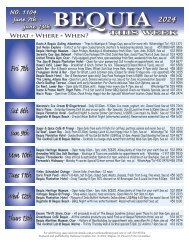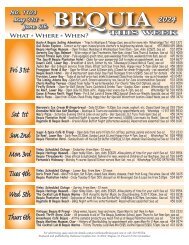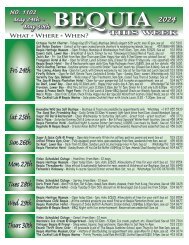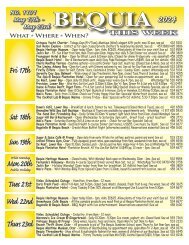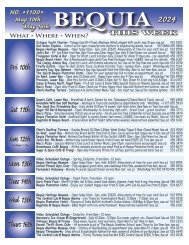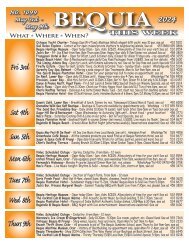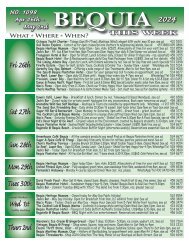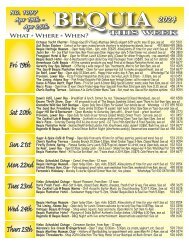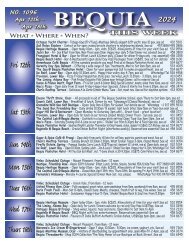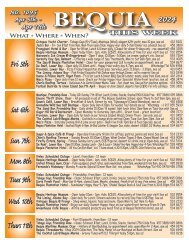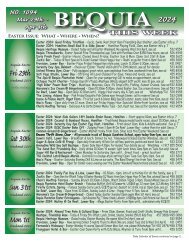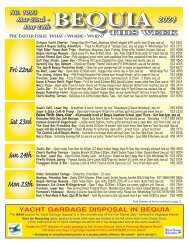Caribbean Compass Yachting Magazine - December 2020
Welcome to Caribbean Compass, the most widely-read boating publication in the Caribbean! THE MOST NEWS YOU CAN USE - feature articles on cruising destinations, regattas, environment, events...
Welcome to Caribbean Compass, the most widely-read boating publication in the Caribbean! THE MOST NEWS YOU CAN USE - feature articles on cruising destinations, regattas, environment, events...
You also want an ePaper? Increase the reach of your titles
YUMPU automatically turns print PDFs into web optimized ePapers that Google loves.
DECEMBER <strong>2020</strong> CARIBBEAN COMPASS PAGE 12<br />
— Continued from previous page<br />
That training culminated in the publication of a<br />
November <strong>2020</strong> study published in the Journal of<br />
Environmental Radioactivity.<br />
The study analyzed sediment cores from coastal<br />
environments in Colombia, Cuba, Dominican Republic,<br />
Guatemala, Haiti, Honduras, Jamaica, Mexico,<br />
Nicaragua, Panama and Venezuela. It identified an<br />
eight- to 21-fold increase in the accumulation of<br />
sediments, when compared with the beginning of the<br />
last century. By dating the collected samples with a<br />
radioisotope of lead, scientists were able to simulate,<br />
model and eventually determine when and in what<br />
quantities sediments had accumulated.<br />
The first such assessment carried out in the<br />
<strong>Caribbean</strong> Sea, the study found that sedimentation<br />
and siltation have been rising in the region since the<br />
beginning of the 20th century, due primarily to<br />
deforestation, soil erosion and poor urban and<br />
industrial waste management. In addition to clarifying<br />
the scale of the sedimentation challenge in the<br />
<strong>Caribbean</strong>, this study provides baseline data upon<br />
which decision-makers can measure the success of<br />
new policies and initiatives.<br />
Read the full story at www.iaea.org/newscenter.<br />
Puerto Rico and USVI Protect Fish and Corals<br />
One size doesn’t fit all, and that cliché was at the<br />
heart of a recent decision to revamp fishing guidelines<br />
in the US <strong>Caribbean</strong>. Until now, the <strong>Caribbean</strong> Fishery<br />
Management Council has set most of its fishing rules<br />
by treating Puerto Rico and the US Virgin Islands as a<br />
single unit. But that approach didn’t account for the<br />
differences in the culture, fishing practices, or marine<br />
environment across the communities.<br />
For example, the plans for St. Croix, Puerto Rico, and<br />
St. Thomas/St. John (the two neighboring islands<br />
share a plan) may now each call for a different catch<br />
limit for the same species, allowing a higher limit where<br />
the fish is more culturally important or more abundant.<br />
Additionally, the plans will prioritize protections on<br />
fish-spawning habitat. Some species return to the same<br />
spots to spawn for generations — protecting these special<br />
places will boost healthy fish populations and improve<br />
the recovery chances for ocean species in decline.<br />
Island-based fishery management plans will now<br />
guide managers in designing policies that are specific<br />
to the biodiversity, culture, and other characteristics<br />
of different locations after the US secretary of commerce<br />
in September approved a proposal to allow such<br />
tailored plans for Puerto Rico and the USVI.<br />
Catch limits for parrotfish will be reduced to account<br />
for their role in maintaining healthy coral reefs, and<br />
harvesting the largest parrotfish will be prohibited.<br />
Island-based fishery management plans also include<br />
proactive measures to promote sustainable fishing of<br />
21 species that currently aren’t regulated, including<br />
dolphinfish (mahi-mahi) — one of the <strong>Caribbean</strong>’s most<br />
popular catches. Plans call for setting annual limits<br />
and identifying essential habitat for each of the newly<br />
managed species. In addition, catch limits for parrotfish<br />
and surgeonfish will be reduced to account for their<br />
essential role in maintaining healthy coral reefs, and<br />
harvesting the largest parrotfish will be prohibited.<br />
The plans will maintain some current rules, such as<br />
a prohibition on harvesting all coral species under<br />
federal jurisdiction or engaging in activities that can<br />
damage corals, such as anchoring boats or using<br />
certain kinds of fishing gear.<br />
Read the full story at www.pewtrusts.org/en/<br />
research-and-analysis/articles.<br />
Renewed Support for Dominica’s Native Parrots<br />
On March 18th, 2018, a few months after Hurricane<br />
Maria ravaged Dominica, the Association for the<br />
Conservation of Threatened Parrots (ACTP) took rare<br />
parrots from the island. These included two Sisserou<br />
(Imperial Parrots, Amazona imperialis) and ten Jaco<br />
(Red-necked Parrots, Amazona arausiaca), all hatched<br />
in the wild. Claiming this was an “emergency measure,”<br />
ACTP took the parrots to a private facility in<br />
Germany. All the parrots had survived Maria and had<br />
been rehabilitated.<br />
The export was not approved by Dominica’s<br />
management or scientific authorities for the Convention<br />
on International Trade in Endangered Species (CITES).<br />
Dominica’s Forestry, Wildlife and Parks Division was<br />
not consulted or informed. Birds<strong>Caribbean</strong> expressed<br />
its deep concern and was among 13 groups that wrote<br />
MICHELLE DANIELS<br />
a letter of protest to the United Nations.<br />
On May 1st, 2018, over 40 well-known scientists<br />
from around the world wrote to Dominican and<br />
German authorities. They urged the return of the birds<br />
and an investigation into ACTP. ACTP was the subject<br />
of two reports in the Australian Guardian later that<br />
year. They were also featured in an article in Audubon<br />
<strong>Magazine</strong>’s Summer <strong>2020</strong> issue, among others. These<br />
revealed that the group also had removed hundreds of<br />
rare parrots from Australia and Brazil, and rare<br />
parrots from St. Lucia and St. Vincent. The articles<br />
also revealed that ACTP’s director had been convicted<br />
of several crimes and has no scientific credentials.<br />
The Sisserou, or Imperial Parrot, is a national symbol<br />
found only on Dominica. This bird was photographed<br />
feeding in the wild after Hurricane Maria.<br />
Birds<strong>Caribbean</strong> approves of Dominica’s plans to<br />
launch new efforts to protect the Sisserou and Jaco<br />
parrots. Both species are rare and live nowhere else in<br />
the world. A recent letter from Dominica’s Ministry of<br />
Environment, Rural Modernization and Kalinago<br />
Upliftment reaffirms the government’s pledge to help<br />
these birds locally, with the help of long-term<br />
international and local partners. This includes the<br />
repatriation of the parrots taken to Germany in 2018.<br />
Other measures include parrot surveys, further<br />
repair of the Parrot Centre, and more. Links with local<br />
nature groups and local skill building will provide for<br />
a hopeful future for these birds.<br />
Visit www.birdscaribbean for more information.<br />
Give <strong>Caribbean</strong> Citizens a Voice<br />
on Environmental Issues!<br />
Environmental civil society organizations (CSOs) in<br />
the <strong>Caribbean</strong> are calling on their governments to give<br />
citizens a voice on environmental issues by enacting<br />
the Escazú Agreement, a first-of-its-kind, peoplecentred<br />
environmental treaty.<br />
With the support and guidance of the <strong>Caribbean</strong><br />
Natural Resources Institute, four of those organizations<br />
— the CCAM Foundation based in Jamaica, The St.<br />
Lucia National Trust, EAG in Antigua, and the<br />
Newcastle Bay Foundation based in St. Kitts & Nevis<br />
— are leading a sustained effort in support of the<br />
agreement and calling for the governments of their<br />
nations to take immediate action to ratify and move<br />
towards implementing the treaty.<br />
The Escazú Agreement is a regional treaty which<br />
supports public access to timely information about<br />
environmental projects, public participation in<br />
environmental decision making, guaranteed<br />
protections for environmental defenders, and access to<br />
justice in environmental matters for Latin American<br />
and <strong>Caribbean</strong> citizens.<br />
These provisions are what make this agreement, as<br />
the first environmental treaty developed in the region,<br />
especially attractive to leading environmental CSOs.<br />
Visit www.cepal.org/en/escazuagreement<br />
for more information.<br />
‘BLUE ECONOMY’ NEWS<br />
As defined at https://thecommonwealth.org/blueeconomy,<br />
the “Blue Economy” is an emerging concept<br />
that encourages better stewardship of our marine<br />
resources. Small island states have vast ocean resources<br />
at their disposal — presenting a huge opportunity for<br />
economic growth and tackling unemployment, food<br />
security and poverty. They also have the most to lose<br />
from the degradation of marine resources.<br />
Similar to the “Green Economy,” the blue economy model<br />
aims for improvement of human wellbeing and social<br />
equity, while significantly reducing environmental risks<br />
and ecological scarcities. It provides for an inclusive model<br />
in which coastal states — which sometimes lack the<br />
capacity to manage their rich ocean resources — can begin<br />
to extend the benefit of those resources to all. Realizing the<br />
full potential of the blue economy means inclusion and<br />
participation of all affected social groups and sectors.<br />
STEPHEN DURAND<br />
Landmark Document on Blue Economy Published<br />
The <strong>Caribbean</strong> Regional Oceanscape Project has<br />
published a landmark document on blue economy and<br />
ocean governance in the Eastern <strong>Caribbean</strong>. The<br />
publication titled “We Are Large Ocean States” chronicles<br />
the OECS journey in marine resource management<br />
reform from the early 1980s to present day. By the turn<br />
of the 21st century, the Organisation of Eastern<br />
<strong>Caribbean</strong> States (OECS) was ready to respond to the<br />
challenges of integrated ocean governance, bringing<br />
marine issues centre stage, and examining how<br />
mainstreaming ocean matters in national and regional<br />
policies can contribute to improved living conditions<br />
and livelihoods, as well as stronger regional integration<br />
and cooperation. OECS States have since been<br />
challenged to make the paradigm shift from Small<br />
Island Developing States to Large Ocean States.<br />
OECS Director General Dr. Didacus Jules says,<br />
“Recognizing that our marine space is about 85 times<br />
larger than our land space, and thus one of our<br />
greatest assets, we are now doing some of the<br />
fundamental work that will allow us to truly claim that<br />
space and contribute to maintaining our <strong>Caribbean</strong><br />
Sea as a zone of peace. We no longer see ourselves<br />
constrained by the challenges typically associated with<br />
small island states, and so we can focus on and steer<br />
towards the opportunities that come with being Large<br />
Ocean States in a global setting.”<br />
A fundamental principle is that, like other sectors,<br />
development of the Blue Economy must be driven by<br />
the people of the OECS and ocean wealth must be<br />
explored in a sustainable manner, for the benefit of all.<br />
Electronic copies of the publication are available to<br />
development partners, policy makers, academia,<br />
media partners, and key stakeholders across Member<br />
States via www.oecs.org.<br />
Blue Economy Assessments<br />
in the Eastern <strong>Caribbean</strong><br />
Atkins, a leading global design, engineering and<br />
project management consultancy, has secured a World<br />
Bank contract to undertake blue economy assessments<br />
in the Eastern <strong>Caribbean</strong> that will help countries<br />
make more sustainable use of their coastal and<br />
marine assets.<br />
The assessments will focus on Grenada, St. Lucia,<br />
St. Vincent & the Grenadines, Dominica, Antigua &<br />
Barbuda, and the Dominican Republic, and will<br />
explore economic and environmental issues and<br />
opportunities relating to fisheries and aquaculture,<br />
sustainable tourism and waste management.<br />
With an anticipated project completion date of June<br />
2021, Atkins will present ideas for early intervention<br />
at national and regional levels to the World Bank at<br />
the end of <strong>2020</strong>. The company will also produce blue<br />
economy roadmaps for each country and will link<br />
these to each country’s marine research agenda,<br />
identifying areas where research is required to inform<br />
which ideas are taken forward.<br />
St George’s University in Grenada will support the<br />
delivery of the project by providing relevant data and<br />
helping with national engagement.<br />
The assessments are directly linked to the UN SDG<br />
14, which sets a 2030 target of increasing the<br />
economic benefits to small island developing states<br />
from the sustainable use of marine resources. They<br />
will also provide strategic direction to assist with<br />
recovery from Covid-19.<br />
Visit https://environment-analyst.com/<br />
global/106086/atkins-wins-caribbean-blue-economystudy-for-world-bank<br />
for more information.<br />
A Blue Economy Caveat<br />
A Barbadian economist is urging caution in the<br />
development of blue economy resources due to the<br />
enormous damage that could result if it is not<br />
undertaken with care. Senator Crystal Drakes rejected<br />
the concept of “perpetual economic growth” and<br />
proposed that economic activity take place with<br />
greater respect for the environment.<br />
Drakes explained: “The blue economy is being seen<br />
across the <strong>Caribbean</strong> as the next frontier for economic<br />
opportunities as ocean-based economic activity is<br />
expected to double in contribution to the global<br />
economy from US$1.5 trillion in 2010 to US$3 trillion<br />
by 2030,” but warned that “The mistakes we made on<br />
land, we cannot afford to make in the marine<br />
environment… Any exploitation of the marine<br />
environment must be coupled with a healthy dose of<br />
sobriety that environmental protection is essential. And<br />
given the cultural importance of coastal areas to<br />
<strong>Caribbean</strong> citizens, any development plan must<br />
enhance the wellbeing of our people. The blue economy<br />
is a perfect example of the paradox of growing with<br />
biophysical limits.<br />
“We have an opportunity to re-fashion our way of<br />
life,” she adds. “Sustainable development for the<br />
<strong>Caribbean</strong> must first start with defining how we<br />
perceive prosperity and re-orienting what we consider<br />
success and progress. This will not be an easy task as<br />
there is an ingrained logic to consumerism and the<br />
value that people place on material goods.”<br />
Read the full story at<br />
https://barbadostoday.bb/<strong>2020</strong>/11/05/<br />
blue-economy-under-threat-from-development.






